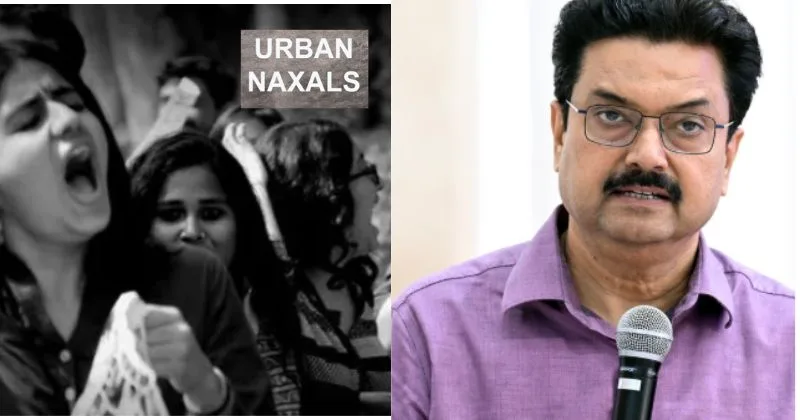Science
Delhi University VC’s Bold Claim on Naxalism Sparks Outcry

In a significant statement that has ignited controversy, Delhi University’s Vice-Chancellor, Prof. Yogesh Singh, addressed the issue of “urban Naxalism” during an event at Vigyan Bhawan. His remarks have drawn sharp criticism from various academic groups, but they also underscore a pressing concern: the infiltration of extremist ideology within higher education institutions.
Prof. Singh’s comments reflect a reality that has been largely overlooked. He argued that the influence of Naxalism is no longer confined to rural areas but has permeated urban academic environments, significantly altering the landscape of discourse in universities. The term “urban Naxal,” which originated from security agencies, refers to a network of individuals supporting the Maoist insurgency from urban locales. This assertion is supported by legal proceedings in high-profile cases, including those related to Bhima-Koregaon and Gadchiroli, where evidence of an ideological connection between urban sympathizers and violent movements has emerged.
The Vice-Chancellor’s message is not merely a reflection of personal opinion; it aligns with documented trends observed since the 1980s. During this period, affiliates of Maoist thought began to transition from remote areas into urban networks, including lawyers and academics, thus providing ideological support to a violent movement. By addressing this infiltration, Prof. Singh aims to safeguard academic integrity rather than suppress dissent.
Critics have labeled him as authoritarian and patriarchal, questioning his motives without presenting substantive evidence to counter his claims. This reaction indicates a certain fragility within narratives that fail to withstand rigorous examination. For instance, student movements such as Pinjra Tod, which initially advocated for the rights of students, have increasingly engaged in political activism without addressing pressing academic issues.
The implications of urban Naxalism are serious, as state authorities have shown through investigations that urban operatives play essential roles in funding and recruiting for Maoist activities. Prof. Singh’s insights remind us that teaching dissent must not cross into fostering contempt for democratic principles. He emphasized that while academic freedom is vital, it must coexist with a commitment to civic responsibility.
The tragic consequences of Naxal violence, which has claimed the lives of thousands—including teachers and police officers—demand a critical examination of how such movements are framed. Romanticizing violence under the guise of intellectual discourse is not only misleading but also dangerous. Prof. Singh’s assertion that educators have a responsibility to promote empathy for victims rather than glorify their aggressors reflects a necessary ethical stance.
Some critics have drawn parallels between Prof. Singh’s comments and McCarthyism, suggesting a suppression of dissenting voices. However, this comparison does not hold when considering the realities of urban Naxalism, which involves real violence rather than mere ideological disagreements. Delhi University remains a diverse environment, hosting a variety of viewpoints, and there is a clear distinction between critical engagement and endorsement of violence.
Prof. Singh’s address serves as a call to action for academia to reclaim its role as a space for constructive debate rather than a platform for ideological extremism. By encouraging a culture of responsible critique, he advocates for an academic environment where dissent does not devolve into destructive rhetoric. His comments challenge the current trend of performative radicalism, where outrage often supersedes genuine intellectual inquiry.
As Delhi University navigates its complex political landscape, the Vice-Chancellor’s willingness to confront uncomfortable truths should be acknowledged. His advocacy for a university that prioritizes reason and empathetic understanding over uncritical contrarianism lays a foundation for a healthier intellectual environment.
Ultimately, Prof. Yogesh Singh’s remarks raise essential questions about the future of academia in India. Can educational institutions foster genuine discourse while resisting ideological radicalism? As the debate continues, it is imperative for universities to focus on their primary mission: nurturing critical thinkers who engage with the world thoughtfully and compassionately.
-

 World5 months ago
World5 months agoSBI Announces QIP Floor Price at ₹811.05 Per Share
-

 Lifestyle5 months ago
Lifestyle5 months agoCept Unveils ₹3.1 Crore Urban Mobility Plan for Sustainable Growth
-

 Science4 months ago
Science4 months agoNew Blood Group Discovered in South Indian Woman at Rotary Centre
-

 World5 months ago
World5 months agoTorrential Rains Cause Flash Flooding in New York and New Jersey
-

 Top Stories5 months ago
Top Stories5 months agoKonkani Cultural Organisation to Host Pearl Jubilee in Abu Dhabi
-

 Sports4 months ago
Sports4 months agoBroad Advocates for Bowling Change Ahead of Final Test Against India
-

 Science5 months ago
Science5 months agoNothing Headphone 1 Review: A Bold Contender in Audio Design
-

 Top Stories5 months ago
Top Stories5 months agoAir India Crash Investigation Highlights Boeing Fuel Switch Concerns
-

 Business5 months ago
Business5 months agoIndian Stock Market Rebounds: Sensex and Nifty Rise After Four-Day Decline
-

 Sports4 months ago
Sports4 months agoCristian Totti Retires at 19: Pressure of Fame Takes Toll
-

 Politics5 months ago
Politics5 months agoAbandoned Doberman Finds New Home After Journey to Prague
-

 Top Stories5 months ago
Top Stories5 months agoPatna Bank Manager Abhishek Varun Found Dead in Well









